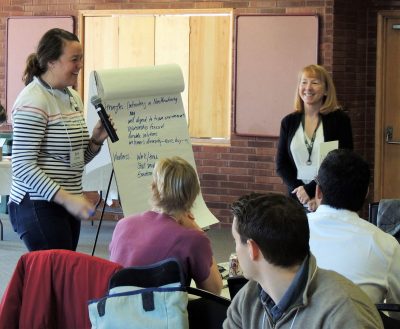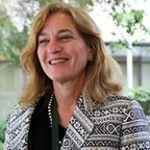
Team Science Workshop 2025
Online this JanuaryEvent Details
Dates: January 22, 23, 29, and 30, 2025
Time: 11:30 am–1:30 pm
Where: Online via Zoom
Cost: Free
Registration: Register as a team.
What is the Team Science Workshop?
The Team Science Workshop is a free, interactive training intended for interdisciplinary research teams working on a translational research project/study or within a research center. Teams will learn the theory and practice of team science. This workshop will be offered virtually during four 2-hour sessions on Wednesdays and Thursdays over a 2-week period.. Each day, we will focus the first 90 minutes on team science education and training, and the final 30 minutes on team working sessions.
Training content will be tailored to address and solve specific challenges identified by the participating teams. By attending the Team Science Workshop, your team will build stronger relationships and acquire strategies and tools to help you become more efficient and effective in your work together.
Topics that may be covered include:
- Teamwork and team processes
- Awareness and adaptability of Social Styles and modes for addressing conflict
- Lean Project Management (e.g., project organization, goal setting, planning)
- Giving and receiving feedback
- Effecitve meetings
- Communication and listening skills
- Leadership skill
What Do Past Attendees Have to Say?
 “Attending the Team Science training made such a difference. I am a new leader and was struggling with how to facilitate a feeling of a team and working toward a common goal. Now the team feels more empowered and we are working together. [What I interpret as] the feeling of being part of a team has made each of them show more commitment to the study and also more open to share ideas. I am telling everyone about this training, it was like water to wine. ”
“Attending the Team Science training made such a difference. I am a new leader and was struggling with how to facilitate a feeling of a team and working toward a common goal. Now the team feels more empowered and we are working together. [What I interpret as] the feeling of being part of a team has made each of them show more commitment to the study and also more open to share ideas. I am telling everyone about this training, it was like water to wine. ”
-Daniela Luquetti, MD, PhD, Seattle Children’s Research Institute, Center for Developmental Biology and Regenerative Medicine
“I am still in awe of the impact that the training had on the members that directly participated in the workshop, in addition to members that were not in attendance. We learned a great deal about ourselves, as well as one another, and have adopted many of the tools/strategies into our day-to-day practices. Although we felt that we had been working well as a group, the education that we received through this formal training program truly pushed our team to function at a much higher level. Because we were able to hone in on strengths and special skill sets for each team member (beyond just our ‘role’ on the team) during the training, we all felt more empowered to exercise those skills (and delegate, when needed) – which elevates the functioning and productivity for the entire team.”
– Carrie Heike, MD, MS, Associate Professor, Department of Pediatrics, Director, Craniofacial Media Lab
…this formal training program truly pushed our team to function at a much higher level.
“We didn’t attend the training having any pre-existing issues that we wanted to resolve. Team training did at least two things for us. One, it forced us to do an outline of the key milestones, which forced us to talk to who’s doing what. Two, it acted as a forcing function for the team to get together. Having those days in person really helped with team building. I think our team is able to collaborate more effectively because of the training.”
– Gary Hsieh, PhD, Associate Professor, Human Centered Design & Engineering
Team Requirements
You should apply for the Team Science Workshop if your team:
- Is an interdisciplinary research team with a specific translational research project
- Has a minimum of 3 team members who can commit to attending the full 4-day online training
- Has the capacity to complete about 20-60 minutes of pre-work before each session
While space is limited for this training, all ITHS members are encouraged to register their teams to attend. Space will be offered on a first-come, first-served basis for teams who meet the above requirements.
Registration
Register by Friday, January 10! Registered teams will receive an Outlook invitation including Zoom links and an email with additional workshop information and prework. Teams with questions about registration can contact Laurel Barchet at lah19@uw.edu.
About the Trainers
 Brenda Zierler, PhD, RN, FAAN is in nursing with a clinical focus on cardiovascular disease, innovative technologies, and a research focus on health systems/health services related to interprofessional collaborative practice for improving team functioning and patient and systems outcomes. Her primary appointment is in the School of Nursing at the University of Washington, but she holds three adjunct appointments – two in the School of Medicine and one in the School of Public Health. Dr. Zierler has 20 years of experience participating, developing, implementing, and testing team approaches to clinical care, research, and education in a variety of environments. Dr. Zierler is co-lead of Team Science education and training, for UW’s Institute of Translational Health Science (ITHS) in the UW School of Medicine. She teaches team science and leadership to nursing PhD students and interdisciplinary research teams. She also teaches quality improvement, patient safety and informatics to undergraduate nursing students. Dr. Zierler is a member of ITHS Antiracism Committee and recently completed a sabbatical project focused on Health Equity Quality Improvement Scholar’s Program for Doctor in Nursing Practice students. She is the past Director of Research and Training for the UW Center for Health Sciences Interprofessional Education Practice and Research (2010-2023), and a past member of the Institute of Medicine’s Global Forum on Innovation in Health Professions Education (2012-2018).
Brenda Zierler, PhD, RN, FAAN is in nursing with a clinical focus on cardiovascular disease, innovative technologies, and a research focus on health systems/health services related to interprofessional collaborative practice for improving team functioning and patient and systems outcomes. Her primary appointment is in the School of Nursing at the University of Washington, but she holds three adjunct appointments – two in the School of Medicine and one in the School of Public Health. Dr. Zierler has 20 years of experience participating, developing, implementing, and testing team approaches to clinical care, research, and education in a variety of environments. Dr. Zierler is co-lead of Team Science education and training, for UW’s Institute of Translational Health Science (ITHS) in the UW School of Medicine. She teaches team science and leadership to nursing PhD students and interdisciplinary research teams. She also teaches quality improvement, patient safety and informatics to undergraduate nursing students. Dr. Zierler is a member of ITHS Antiracism Committee and recently completed a sabbatical project focused on Health Equity Quality Improvement Scholar’s Program for Doctor in Nursing Practice students. She is the past Director of Research and Training for the UW Center for Health Sciences Interprofessional Education Practice and Research (2010-2023), and a past member of the Institute of Medicine’s Global Forum on Innovation in Health Professions Education (2012-2018).
 Jennifer Sprecher, MS, BS IE, Executive Coach, Lean Six Sigma Black Belt. Ms. Sprecher is the Director of Strategy Development for the UW School of Nursing and has 5 years of experience and knowledge with team science training and coaching and over 20 years of experience with facilitation and lean project management. Ms. Sprecher works within organizations by implementing concepts of Lean Project Management, measurement systems, change management, benchmarking, team problem solving and leadership coaching to improve organizational performance and workplace satisfaction by increasing engagement. Through application of leadership and team coaching concepts and various assessments, she helps departmental chairs, technical and operational leaders and teams achieve their desired goals and vision.
Jennifer Sprecher, MS, BS IE, Executive Coach, Lean Six Sigma Black Belt. Ms. Sprecher is the Director of Strategy Development for the UW School of Nursing and has 5 years of experience and knowledge with team science training and coaching and over 20 years of experience with facilitation and lean project management. Ms. Sprecher works within organizations by implementing concepts of Lean Project Management, measurement systems, change management, benchmarking, team problem solving and leadership coaching to improve organizational performance and workplace satisfaction by increasing engagement. Through application of leadership and team coaching concepts and various assessments, she helps departmental chairs, technical and operational leaders and teams achieve their desired goals and vision.
Erin Abu-Rish Blakeney, PhD, RN, is co-lead of the UW ITHS Team Science Core and a Research Associate Professor in the Department of Biobehavioral Nursing and Health Informatics at the UW School of Nursing. Dr. Blakeney’s program of research focuses on how teams work together and how their teamwork influences the production of new knowledge and translation of research into practice along the entire classroom to bench to bedside spectrum. She has nearly 15 years of experience developing, implementing, and evaluating team approaches to interdisciplinary education, healthcare, and research.



